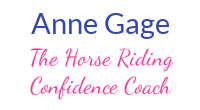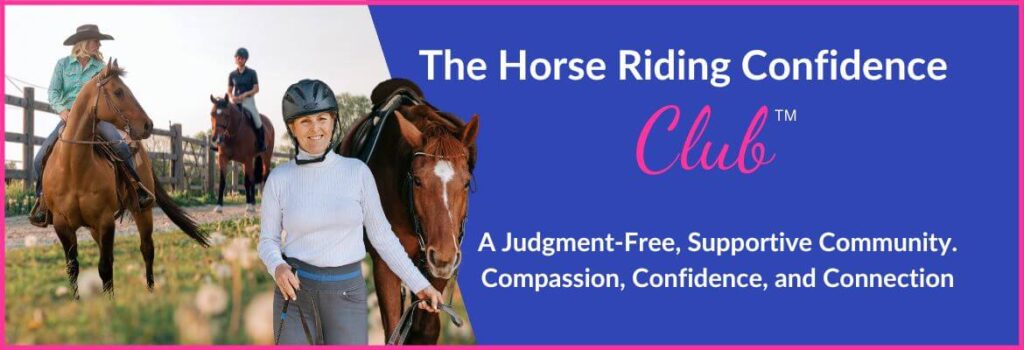What habits does your horse have that annoy you? Something seemingly small and unimportant, but annoying none the less.
Maybe he pulls away to grab grass. Or bites the lead rope or reins when you're leading him.
Does he make faces or threaten to bite (although he never has - yet) when tightening the girth or cinch?
Or maybe it's a struggle to get the on because he won't lower his head or clamps his mouth shut refusing to take the bit.
Whatever it is, you wish he would just stop doing that behaviour so you aren't left feeling so frustrated, annoyed or anxious.
Would you prefer to get on a horse who is calm and comfortable from the moment you get in the saddle? Or one who is stressed and tense?
How your horse behaves before you ride makes a big difference to whether you're getting on a calm or a tense horse.
I'm working with a horse who hasn't been ridden since last summer. My client had planned to get him back in work this spring.
But, then she was struck with a health issue that means she can't ride for a while.
She just wanted me to do a bit of ground work and then start riding her horse for her so that once she gets the okay from her doctor, she can ride him right away.
So, the first session was some basic ground work to re-establish boundaries (a 17.2 hh thoroughbred gelding should not behave like a lap dog!) and get his riding muscles back to work.
I didn't put any tack on him until the 2nd session when I was going to lunge him with his bridle and surcingle.
That's where we hit the first road block.
He didn't want to take the bit.
We were in the round pen at the time, so he simply put his head up (17.2 hh gelding vs 5'6" woman) and backed up. Huh!
"I usually tack him up in his stall" said my client.
She has an older barn with fairly low ceilings, so that limits how high he can raise his head. And, of course, it's much harder to 'get away' in a stall.
Note: We're pretty sure that pain is not the cause of this behaviour. He has regular, routine veterinary care including having his teeth checked and floated. His saddle has been professionally fitted.
I could have taken him to his stall and got the bridle on.
It would have also required jamming my finger in the corner of his mouth to get him to take the bit since he holds his mouth tightly closed.
The horse would have been bridled. But, he also would have been stressed and tense.
And the issue would not have been resolved.
An Unhappy Horse Is A Tense Horse
I told my client I was going to address this avoidance behaviour because it's a sign he's not happy about being tacked up.
And if your horse is not happy, there's going to be tension by the time you get in the saddle.
Wouldn't you rather start your ride with a calm horse from the moment you get in the saddle?
So, we stayed in the round pen and focused on using positive reinforcement to change the horse's negative response to being bridled.
Why Use Positive Reinforcement?
Once there's a negative connection to a "trigger" (in science it's called a "stimulus" and it can be an object, a location or even a person), positive reinforcement is the best way to connect that same stimulus to a pleasant feeling.
The sessions were short - less than 30 minutes. Each session focused on a specific behaviour that the horse needs to do in order to take the bit.
Standing still while I held the bridle near his head.
Allowing me to hold his nose with one hand.
Touching the bit with his muzzle.
Opening his mouth to take the bit.
Extending the length of time the bit was in his mouth.
Allowing me to put the bridle over his ears.
Etc. Etc. Etc.
I didn't move on to the next step until he was doing the previous step consistently.
If he failed to do what he was being asked to do, there was no punishment. I just waited a moment then started over.
It took several sessions because his owner wasn't able to work with him between our sessions.
Soon, the horse was taking the bit easily and calmly ... and most importantly, willingly.
Without force. Without stress. Without tension.
As many of my clients have said when I've used positive reinforcement to change their horse's behaviour... "it takes a lot of patience to do that".
Yes. It does.
But, how long does it take you to change a habit ... a behaviour you've had for a long time.
Or a behaviour that's connected to a specific "trigger" (like snakes, June bugs or dentists... ugh!)
Change won't happen over night.
But, it will happen. With patience, consistency and empathy.
A Calm Horse Trusts And Learns More Easily
As your horse feels calm about one step of the process, that calmness carries over to the next.
The more often your horse feels calm, the less often he gives has a negative reaction to things in general.
The more he trusts you because you always help him to feel calm and safe.
The easier it is for him to learn because, just like us, horses learn best when they're relaxed.
So, here's my question for you ...
What are you tolerating with your horse? What does he do that frustrates, annoys or even scares you?
Would you like to stop dealing with an unwanted behaviour, and instead, have you both feeling less stressed?
You and your horse both feeling more calm, confident and connected.
Picture yourself having the partnership with your horse that you've been dreaming of.
Feel the connection you'll have - without the need to use force or gadgets to "make" him behave or demanding that he respect you.
What it boils down to is that you want to be the rider your horse needs you to be. So that you both can feel calm, confident and connected.
If I could tell you a way that your horse would do what you want willingly and without any tension, you would at least want to look at it, wouldn't you?
These are the types of issues we work on inside The Horse Riding Confidence Club - my VIP online group coaching membership.
A safe, supportive space created specifically for women like you — where fears are understood, questions are welcomed, and confidence is rebuilt step by step.
This could be just what you're looking for!


